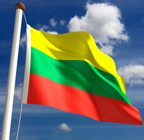Lithuania celebrates a millennium of being mentioned
 Vilnius - Not many countries would go out of their way to stage a proud public celebration of murder.
Vilnius - Not many countries would go out of their way to stage a proud public celebration of murder.
But a thousand years is a long time in Baltic history, and few Lithuanians will feel any pangs of regret on July 6 when the country marks a millennium since it was first mentioned in the history books.
The 1009 Chronicles of Quedlinburg in Germany record that "St Bruno, alias Bonifacius, archbishop and monk, was killed by the pagans together with 18 of his brethren on the Russian-Lithuanian border on the eleventh year of his conversion."
Such an event might be an unfortunate way to launch a national identity, but it has been taken up with enthusiasm in Lithuania with millennial posters visible throughout the capital, Vilnius.
A range of commemorative events are planned including conferences, concerts and the awarding of a special state decoration called the Lithuanian Millennium Star.
A State Commission on the Commemoration of the Millennium of the Name of Lithuania was formed in 1997 to make sure Lithuanians are aware of their heritage. It has been working towards the main July 6 festivities ever since.
"One might say that Columbus discovered America, while St. Bruno discovered Lithuania," the organization's website says - omitting the important detail that Columbus made it back alive.
A recent poll found that two-thirds of the population consider the marking of one thousands years since the first mention of Lithuania's name an important event, with one-third describing themselves as "completely indifferent."
Despite being a republic, EU member state Lithuania has also been busy building itself a royal palace to provide a focus for the celebrations.
Dignitaries from several European monarchies including Denmark, Sweden and Norway are expected to attend the new palace on July 6 along with a liberal sprinkling of presidents and other dignitaries from across Europe.
However, costs for the rebuilding of the former royal palace, which was flattened 200 years ago, have ballooned to more than 200 million litas (82 million dollars) and work is still far from complete.
"Two thirds of the palace will be completed if we get (another) 44 million litas (18 million dollars) next year," Head of Lithuania's Directorate of Castles Saulius Andrasiunas said in June - though he added that the estimate did not include painting costs.
The ultimate aim is for the reconstructed palace to become "a poly-functional historical centre of culture."
The royal palace event forms an important part of Vilnius' year as one of two European Capitals of Culture for 2009 (the other being the Austrian city of Linz), though that too has been dogged by controversy.
A serious economic recession in Lithuania saw the government of Prime Minister Andrius Kubilius slash millions of dollars from the Capital of Culture budget which reduced the number and scale of planned events, resulting in a letter of protest from representatives of other Capitals of Culture.
Visitor numbers have also been hit by the bankruptcy of the national airline, FLyLAL.
Celebrations at the royal palace on July 6 will start with a flag- hoisting ceremony followed by a speech from President Valdas Adamkus, after which the dignitaries will attend mass at Vilnius Cathedral.
Lithuania was the last place in Europe to be converted to Christianity but today is one of the continent's most devout Catholic countries - a fact which should provide at least some solace to the soul of St Bruno. (dpa)